Michael Staniek
Embedding-Space Data Augmentation to Prevent Membership Inference Attacks in Clinical Time Series Forecasting
Nov 07, 2025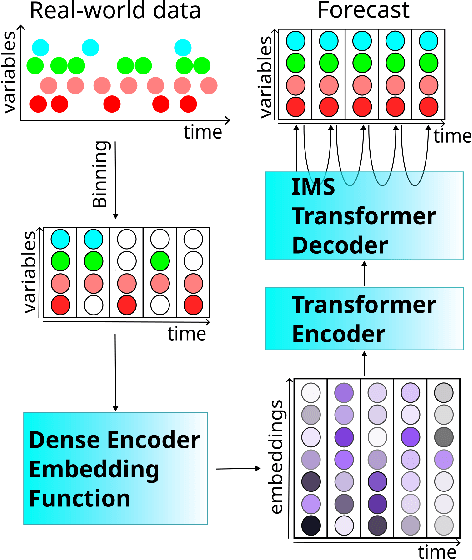
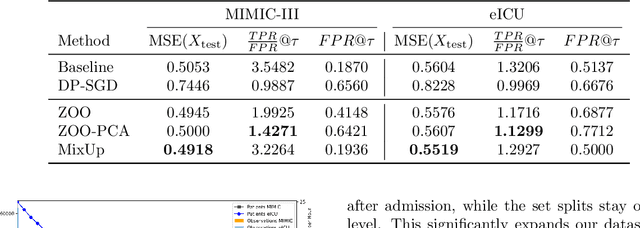
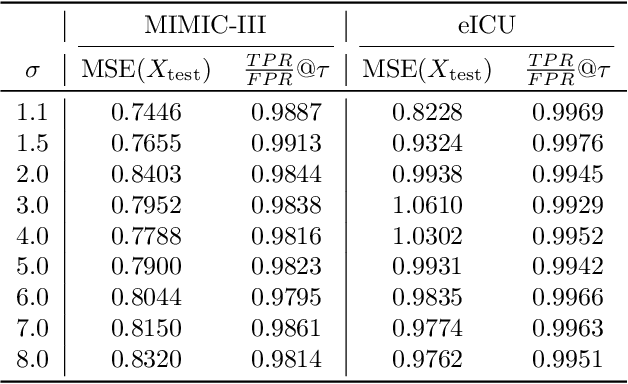
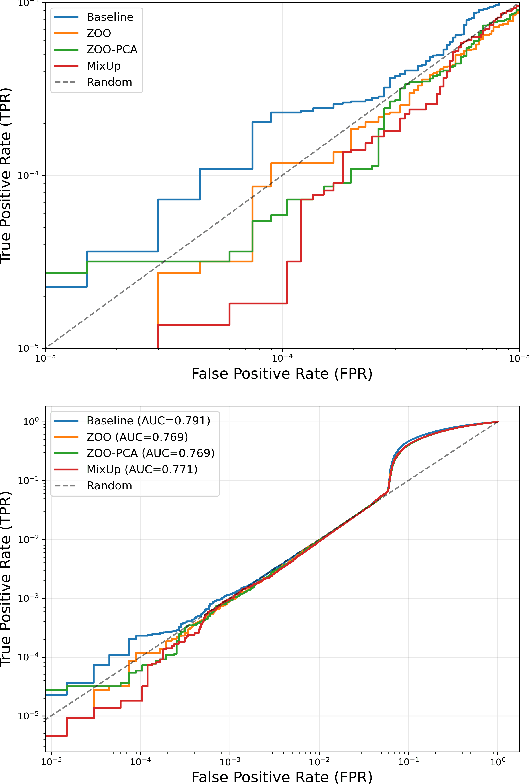
Abstract:Balancing strong privacy guarantees with high predictive performance is critical for time series forecasting (TSF) tasks involving Electronic Health Records (EHR). In this study, we explore how data augmentation can mitigate Membership Inference Attacks (MIA) on TSF models. We show that retraining with synthetic data can substantially reduce the effectiveness of loss-based MIAs by reducing the attacker's true-positive to false-positive ratio. The key challenge is generating synthetic samples that closely resemble the original training data to confuse the attacker, while also introducing enough novelty to enhance the model's ability to generalize to unseen data. We examine multiple augmentation strategies - Zeroth-Order Optimization (ZOO), a variant of ZOO constrained by Principal Component Analysis (ZOO-PCA), and MixUp - to strengthen model resilience without sacrificing accuracy. Our experimental results show that ZOO-PCA yields the best reductions in TPR/FPR ratio for MIA attacks without sacrificing performance on test data.
Compositionality in Time Series: A Proof of Concept using Symbolic Dynamics and Compositional Data Augmentation
Aug 28, 2025Abstract:This work investigates whether time series of natural phenomena can be understood as being generated by sequences of latent states which are ordered in systematic and regular ways. We focus on clinical time series and ask whether clinical measurements can be interpreted as being generated by meaningful physiological states whose succession follows systematic principles. Uncovering the underlying compositional structure will allow us to create synthetic data to alleviate the notorious problem of sparse and low-resource data settings in clinical time series forecasting, and deepen our understanding of clinical data. We start by conceptualizing compositionality for time series as a property of the data generation process, and then study data-driven procedures that can reconstruct the elementary states and composition rules of this process. We evaluate the success of this methods using two empirical tests originating from a domain adaptation perspective. Both tests infer the similarity of the original time series distribution and the synthetic time series distribution from the similarity of expected risk of time series forecasting models trained and tested on original and synthesized data in specific ways. Our experimental results show that the test set performance achieved by training on compositionally synthesized data is comparable to training on original clinical time series data, and that evaluation of models on compositionally synthesized test data shows similar results to evaluating on original test data, outperforming randomization-based data augmentation. An additional downstream evaluation of the prediction task of sequential organ failure assessment (SOFA) scores shows significant performance gains when model training is entirely based on compositionally synthesized data compared to training on original data.
Early Prediction of Causes (not Effects) in Healthcare by Long-Term Clinical Time Series Forecasting
Aug 07, 2024Abstract:Machine learning for early syndrome diagnosis aims to solve the intricate task of predicting a ground truth label that most often is the outcome (effect) of a medical consensus definition applied to observed clinical measurements (causes), given clinical measurements observed several hours before. Instead of focusing on the prediction of the future effect, we propose to directly predict the causes via time series forecasting (TSF) of clinical variables and determine the effect by applying the gold standard consensus definition to the forecasted values. This method has the invaluable advantage of being straightforwardly interpretable to clinical practitioners, and because model training does not rely on a particular label anymore, the forecasted data can be used to predict any consensus-based label. We exemplify our method by means of long-term TSF with Transformer models, with a focus on accurate prediction of sparse clinical variables involved in the SOFA-based Sepsis-3 definition and the new Simplified Acute Physiology Score (SAPS-II) definition. Our experiments are conducted on two datasets and show that contrary to recent proposals which advocate set function encoders for time series and direct multi-step decoders, best results are achieved by a combination of standard dense encoders with iterative multi-step decoders. The key for success of iterative multi-step decoding can be attributed to its ability to capture cross-variate dependencies and to a student forcing training strategy that teaches the model to rely on its own previous time step predictions for the next time step prediction.
Text-to-OverpassQL: A Natural Language Interface for Complex Geodata Querying of OpenStreetMap
Aug 30, 2023Abstract:We present Text-to-OverpassQL, a task designed to facilitate a natural language interface for querying geodata from OpenStreetMap (OSM). The Overpass Query Language (OverpassQL) allows users to formulate complex database queries and is widely adopted in the OSM ecosystem. Generating Overpass queries from natural language input serves multiple use-cases. It enables novice users to utilize OverpassQL without prior knowledge, assists experienced users with crafting advanced queries, and enables tool-augmented large language models to access information stored in the OSM database. In order to assess the performance of current sequence generation models on this task, we propose OverpassNL, a dataset of 8,352 queries with corresponding natural language inputs. We further introduce task specific evaluation metrics and ground the evaluation of the Text-to-OverpassQL task by executing the queries against the OSM database. We establish strong baselines by finetuning sequence-to-sequence models and adapting large language models with in-context examples. The detailed evaluation reveals strengths and weaknesses of the considered learning strategies, laying the foundations for further research into the Text-to-OverpassQL task.
Error-Aware Interactive Semantic Parsing of OpenStreetMap
Jun 22, 2021



Abstract:In semantic parsing of geographical queries against real-world databases such as OpenStreetMap (OSM), unique correct answers do not necessarily exist. Instead, the truth might be lying in the eye of the user, who needs to enter an interactive setup where ambiguities can be resolved and parsing mistakes can be corrected. Our work presents an approach to interactive semantic parsing where an explicit error detection is performed, and a clarification question is generated that pinpoints the suspected source of ambiguity or error and communicates it to the human user. Our experimental results show that a combination of entropy-based uncertainty detection and beam search, together with multi-source training on clarification question, initial parse, and user answer, results in improvements of 1.2% F1 score on a parser that already performs at 90.26% on the NLMaps dataset for OSM semantic parsing.
Assessing the Difficulty of Classifying ConceptNet Relations in a Multi-Label Classification Setting
May 14, 2019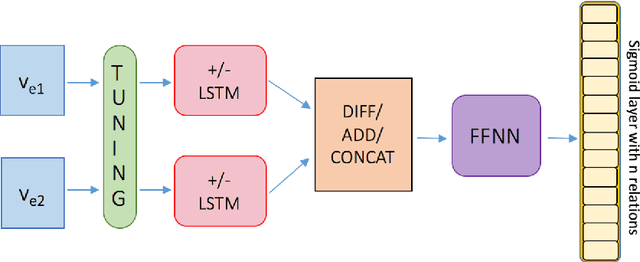

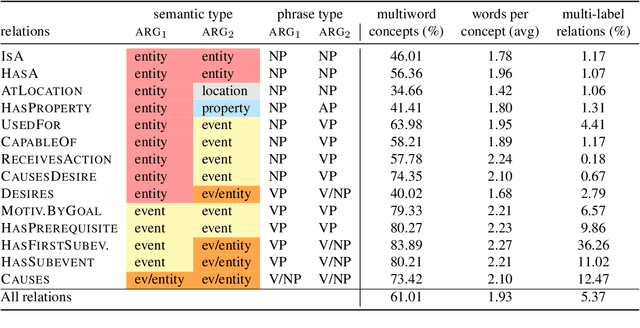
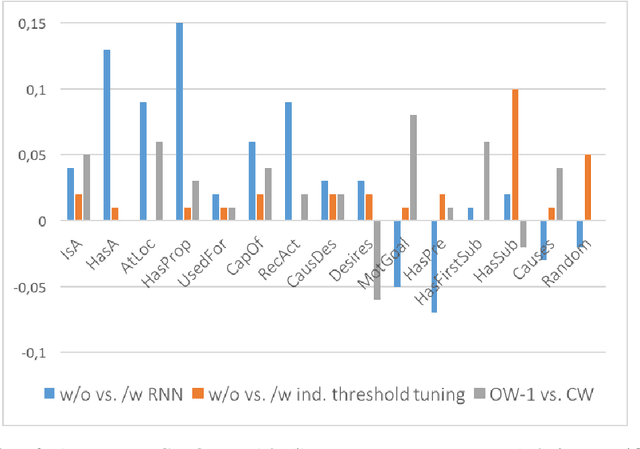
Abstract:Commonsense knowledge relations are crucial for advanced NLU tasks. We examine the learnability of such relations as represented in CONCEPTNET, taking into account their specific properties, which can make relation classification difficult: a given concept pair can be linked by multiple relation types, and relations can have multi-word arguments of diverse semantic types. We explore a neural open world multi-label classification approach that focuses on the evaluation of classification accuracy for individual relations. Based on an in-depth study of the specific properties of the CONCEPTNET resource, we investigate the impact of different relation representations and model variations. Our analysis reveals that the complexity of argument types and relation ambiguity are the most important challenges to address. We design a customized evaluation method to address the incompleteness of the resource that can be expanded in future work.
 Add to Chrome
Add to Chrome Add to Firefox
Add to Firefox Add to Edge
Add to Edge